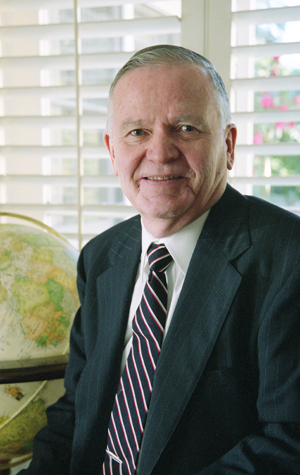Frederick S. Pardee Endows New Global Studies School
BU school’s mission: “advancing human progress”

Building on its growing international profile and the global scope of its programs for research and education, Boston University is launching a new school, to be named for its largest benefactor.
The Frederick S. Pardee School of Global Studies, to be housed in the College of Art & Sciences, will open next fall. The goal of the Pardee School will be to bring together faculty from across the University to support uniquely interdisciplinary research aimed at the great challenge of advancing global human progress and educating the next generation of leaders who will address these issues. Improving the human condition around the globe is at the core of the school’s mission.
Pardee (SMG’54, GSM’54, Hon.’06) donated $25 million to endow the school, matching the largest single gift in University history, Trustee Rajen Kilachand’s $25 million for the Kilachand Honors College in 2011—the next year Kilachand gave another $10 million to renovate Kilachand Hall as a residence for Honors College students. Pardee’s gift brings his lifetime giving to BU to almost $40 million, the most of any supporter.
“Mr. Pardee’s investment in Boston University and his vision of moving higher education forward to pioneer a new approach to address the important issues facing human development are extraordinary,” President Robert A. Brown says. “The Pardee School will be transformational in our effort to prepare our students to work on the great challenges in the world.”
Pardee established the Frederick S. Pardee Center for the Study of the Longer-Range Future 13 years ago as an interdisciplinary research center. The Pardee Center will be the “research engine” for the new school, Provost Jean Morrison says.
In CAS, “international education and research have been central to our mission—this has been one of the strong elements of our signature,” says Virginia Sapiro, dean of Arts & Sciences. “Global education has long been a strong suit of Boston University both in the classroom and through the very large Study Abroad program, which currently serves more than 40 percent of all the undergraduate population of the University.” With the creation of the Pardee School, “we will have an unparalleled opportunity to take giant strides forward in this work, advancing human progress through education and research.”
Sapiro says that at its inception the Pardee School will have two divisions: one for regional studies and another for international studies. The former will bring together the college’s areas studies programs—the Center for the Study of Asia, the Center for the Study of Europe, the Latin American Studies Program, the African Studies Center, the Institute for the Study of Muslim Societies and Civilizations, and the new Middle East and North Africa Studies Program. Each “in itself is a unifying force for faculty and students across many disciplines” at CAS and other BU schools, Sapiro says. Many already grant degrees and certificates, and clustered in the new school, “we imagine they will together develop new academic programs that bring together the expertise of our faculty in exciting ways.”
The Pardee School’s international studies division will incorporate the CAS international relations department along with additional faculty, offering the degrees the department currently awards. But in addition, the division is expected to develop new and pathbreaking curricula that will be “consistent with the emerging Pardee School vision,” Sapiro says.
“Overall, we’re talking about hundreds of faculty from all over campus—mostly but not entirely in CAS—who will be involved,” she adds. Fewer than 50 will be wholly appointed faculty at the Pardee School; many professors will have joint appointments, tenured or not, in the Pardee School and other CAS departments.
The location of the Pardee School’s administrative offices has not been set, Sapiro says. “With this generous gift, we will have better spaces in which to function, and we will have added support for faculty, research, and graduate fellowships.”
Pardee, a former think tank economist who heads a real estate management firm in Los Angeles, developed a passion for creating a more peaceful, better world in his youth during the upheaval of the Second World War. He attended BU on scholarship and has called that aid, and his studies at the School of Management, essential to his life and career.
The new school’s nascent mission statement declares its dedication “to advancing human progress and improving the human condition through rigorous and creative undergraduate, graduate, and professional education; pathbreaking research; and active engagement in innovative projects that apply this education and knowledge [to] the critical challenges humanity faces.”
The statement says that unique among international studies schools, the Pardee School’s research and teaching will “weave together” the social sciences, the natural sciences, and the humanities.
“We’re deeply grateful to Mr. Pardee,” Morrison says. BU “has long been a globally connected university, and this school will cement our leadership role to educate the next generation of global leaders.”

Comments & Discussion
Boston University moderates comments to facilitate an informed, substantive, civil conversation. Abusive, profane, self-promotional, misleading, incoherent or off-topic comments will be rejected. Moderators are staffed during regular business hours (EST) and can only accept comments written in English. Statistics or facts must include a citation or a link to the citation.